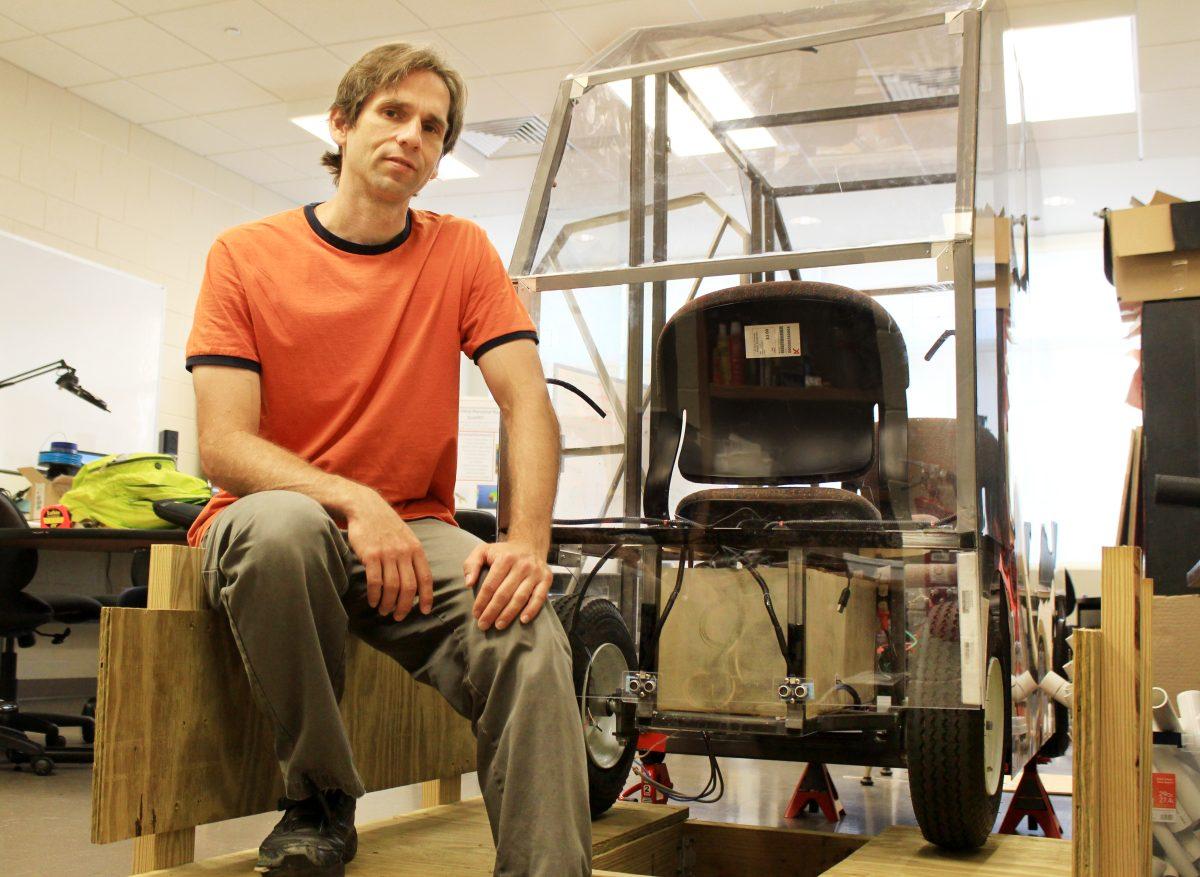 Seth Hollar, associate director of the Engineering Entrepreneurs Program at NC State and co-visionary behind the EcoPRT rail system, envisions that automated fiberglass cars will be used to transport people between Centennial and Main Campus in the future. “It will solve the problem of focusing on extremely small and lightweight vehicles, so if you need to build infrastructure, for example bridges, its lightweight and small form factor make it much less expensive than traditional solutions to move people around,” Hollar said. " />
Seth Hollar, associate director of the Engineering Entrepreneurs Program at NC State and co-visionary behind the EcoPRT rail system, envisions that automated fiberglass cars will be used to transport people between Centennial and Main Campus in the future. “It will solve the problem of focusing on extremely small and lightweight vehicles, so if you need to build infrastructure, for example bridges, its lightweight and small form factor make it much less expensive than traditional solutions to move people around,” Hollar said. " />
Photo by Abhilasha Jain
Seth Hollar, associate director of the Engineering Entrepreneurs Program at NC State and co-visionary behind the EcoPRT rail system, envisions that automated fiberglass cars will be used to transport people between Centennial and Main Campus in the future. “It will solve the problem of focusing on extremely small and lightweight vehicles, so if you need to build infrastructure, for example bridges, its lightweight and small form factor make it much less expensive than traditional solutions to move people around,” Hollar said.
Traffic along Avent Ferry Road and Western Boulevard could be significantly cut back with separate lanes for futuristic-looking golf carts that would connect Centennial and Central Campus and traffic lights that would change based on the traffic flow, according to The News & Observer.
This would all be possible if Raleigh is granted the U.S. Department of Transportation’s $40 million “smart city” grant that will be awarded to the most forward-thinking city. Raleigh plans to be a forward-thinking city by launching eco-friendly transportation around NC State.
The average American is stuck in traffic for about 40 hours a year and the transportation sector makes up 28 percent of the world’s greenhouse gas emissions. The federal government wants to change this by providing America with more efficient, sustainable transportation options.
City planners partnered with NC State engineers to complete the grant application. They have been planning ecoPRT for years, a transit system made up of electric, self-driving pods. These pods would first be installed around the oval on Centennial Campus and then expanded to Western Boulevard to connect to Central Campus.
The pods are still in the conceptual phase, but engineering students have built a few pods. Now the design still has to be refined so it can be mass-produced. Each pod would weigh around 500 pounds and would have four-wheel drive, crash-avoidance technology and air conditioning.
Smaller grants have already been given to ecoPRT, but the DOT grant would give it the funding to make it a reality.
Avent Ferry has higher bus ridership than any other corridor in the city. Also, as part of the grant, Raleigh would launch self-driving buses along Avent Ferry, equip city vehicles with the same self-driving technology and traffic sensors to the local road network.
Raleigh is one of 77 cities applying for the grant. The U.S. DOT will choose five finalists on March 21 and decide on the winner sometime in June. Cities applying for the grant must have a population between 200,000 and 800,000 people, already have a public transportation system and the proposed strategies must be realistic within that system.